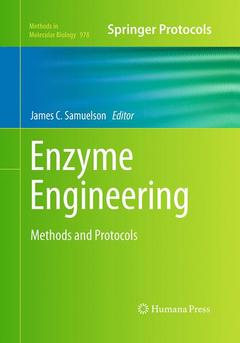Description
Enzyme Engineering, 2013
Methods and Protocols
Methods in Molecular Biology Series, Vol. 978
Coordinator: Samuelson James C.
Language: English
Subject for Enzyme Engineering:
Publication date: 08-2016
Support: Print on demand
Publication date: 02-2013
252 p. · 17.8x25.4 cm · Hardback
Description
/li>Contents
/li>Comment
/li>
Whether the pursuit is commercially motivated or purely academic, engineering a novel biological catalyst is an enticing challenge. High-resolution protein structure analysis allows for rational alteration of enzyme function, yet many useful enzyme variants are the product of well-designed selection schemes or screening strategies. Enzyme Engineering: Methods and Protocols provides guidance to investigators wishing to create enzyme variants with desired properties. This detailed volume covers such topics as a simple method for generating site-specific mutations within bacterial chromosomes. It also highlights the engineering of two difference types of rare-cutting endonucleases that show great potential in gene therapy applications: The newest development is the emergence of TAL effector nucleases or TALENs. Chapters describe newly developed technologies in sufficient detail so that each method can be practiced in a standard molecular biology laboratory. Written in the successful Methods in Molecular Biology? series format, chapters include introductions to their respective topics, lists of the necessary materials and reagents, step-by-step, readily reproducible protocols, and notes on troubleshooting and avoiding known pitfalls.
Authoritative and easily accessible Enzyme Engineering: Methods and Protocols will be valuable for scientists with a budding interest in protein engineering as well as veterans looking for new approaches to apply in established discovery programs.
A Tripartite Fusion System for the Selection of Protein Variants with Increased Stability in vivo.- Determining Enzyme Kinetics via Isothermal Titration Calorimetry.- GFP Reporter Screens for the Engineering of Amino Acid Degrading Enzymes from Libraries Expressed in Bacteria.- Flow Cytometric Assays for Interrogating LAGLIDADG Homing Endonuclease DNA Binding and Cleavage Properties.- TAL Effector Nuclease (TALEN) Engineering.- In vitro Evolution of Enzymes.- Residue-Specific Incorporation of Unnatural Amino Acids into Proteins In vitro and In vivo.- Reconstructing Evolutionary Adaptive Paths for Protein Engineering.- Oligonucleotide Recombination Enabled Site-Specific Mutagenesis in Bacteria.- FX Cloning: A Versatile High-Throughput Cloning System for Characterization of Enzyme Variants.- Use of Sulfolobus solfataricus PCNA Subunit Proteins to Direct the Assembly of Multimeric Enzyme Complexes.- Gene Synthesis by Assembly of Deoxyuridine Containing Oligonucleotides.- Protein Engineering: Single or Multiple Site-Directed Mutagenesis.- Gene Assembly and Combinatorial Libraries in S. cerevisiae via Reiterative Recombination.- Promiscuity-Based Enzyme Selection for Rational Directed Evolution Experiments.- Rational Protein Sequence Diversification by Multi-Codon Scanning Mutagenesis.- Screening Libraries for Improved Solubility: Using E. coli Dihydrofolate Reductase as a Reporter.- In Vitro Directed Evolution of Enzymes Expressed by E. coli in Micro-Titre Plates.




